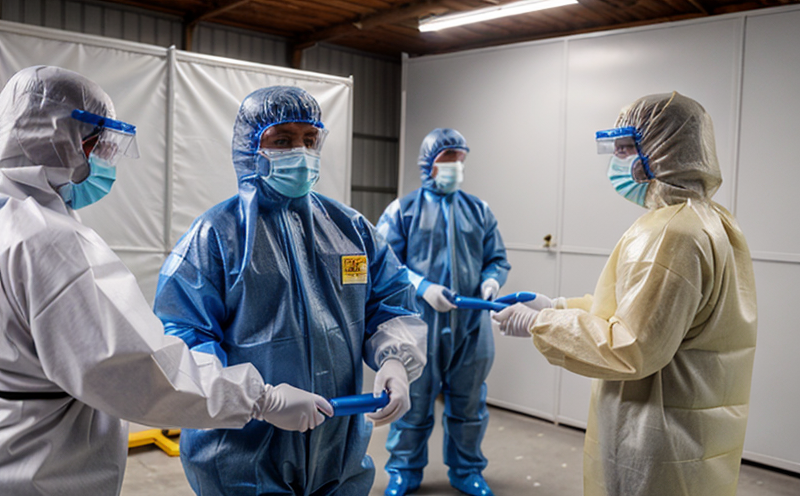Mechanical resistance testing of industrial safety suits
The mechanical resistance testing of industrial safety suits is a critical process in ensuring that protective clothing meets stringent standards and performs reliably under various working conditions. This test evaluates the suit's ability to withstand physical stresses such as punctures, cuts, tears, abrasions, and other forms of mechanical damage. The results are essential for confirming that workers remain protected from potential hazards on the job site.
Industries like manufacturing, construction, mining, and emergency services often rely on safety suits to provide a barrier against hazardous materials, sharp objects, and extreme temperatures. Ensuring these suits meet the necessary mechanical resistance standards is crucial in preventing injuries or fatalities that could otherwise occur due to compromised protective clothing.
The testing process involves subjecting specimens of industrial safety suits to specific mechanical forces designed to simulate real-world scenarios. This includes using specialized machines that can apply pressure, shear force, and abrasion against the fabric. The test aims to determine how much stress each suit can withstand before failing. Compliance with relevant international standards such as ISO 16703:2013 for cut resistance, EN 374-4:2020 for chemical protection, or ASTM F1506 for flame resistance is essential.
Proper specimen preparation is critical to ensure accurate test results. This includes selecting appropriate samples that represent the full range of materials and designs used in industrial safety suits. Preparing these specimens correctly ensures they are representative of the actual products being tested, allowing for reliable measurement of mechanical properties.
The chosen instrumentation plays a vital role in obtaining precise measurements during mechanical resistance testing. High-quality machines equipped with sensors capable of monitoring force, displacement, and other relevant parameters provide accurate data. These instruments must also adhere to established calibration procedures to maintain consistent performance over time.
Reporting the results of these tests accurately is equally important. Detailed reports should outline all test conditions, including applied forces, observed outcomes, and any deviations from expected behavior. Compliance with recognized standards ensures consistency across different laboratories performing similar tests. Additionally, clear communication between testers and clients helps ensure both parties understand the significance of the findings.
By conducting rigorous mechanical resistance testing on industrial safety suits, employers can significantly enhance worker safety by identifying potential weaknesses in protective gear before they become critical issues. Regular inspections through this type of testing help maintain high levels of protection across all work environments where hazardous conditions exist.
Eurolab Advantages
At Eurolab, we pride ourselves on providing comprehensive mechanical resistance testing services tailored specifically for industrial safety suits. Our team of experienced professionals uses state-of-the-art equipment and follows strict protocols to ensure accurate results every time.
- ISO/IEC 17025 Accreditation: Ensures our laboratory meets international standards for technical competence.
- Comprehensive Test Capabilities: We offer a wide range of mechanical resistance tests suitable for various types of protective clothing.
- Expertise in Industrial Applications: Our staff has extensive experience working with industries that depend heavily on robust safety gear.
- Custom Solutions: Whether you need routine testing or specialized evaluations, we can accommodate your unique requirements.
- Fast Turnaround Times: Minimize downtime by relying on our efficient processing and reporting processes.
- Compliance Support: Stay ahead of regulatory changes with expert guidance from our knowledgeable team.
- Detailed Reporting: Receive comprehensive reports that provide actionable insights for improving product quality.
Choose Eurolab for all your mechanical resistance testing needs related to industrial safety suits. Let us help you safeguard your workforce against potential hazards effectively and efficiently.
Why Choose This Test
- Ensures Compliance with Standards: Verify that protective clothing adheres to relevant international standards like ISO 16703:2013 and EN 374-4:2020.
- Enhances Worker Safety: By identifying potential vulnerabilities early, you can take corrective actions before incidents occur.
- Promotes Product Quality: Regular testing helps maintain consistent performance across all batches of manufactured safety suits.
- Saves Time and Money: Identifying issues during development rather than after deployment reduces costs associated with rework or recalls.
- Builds Trust with Stakeholders: Demonstrating a commitment to worker safety through rigorous testing can enhance your company's reputation among customers and partners.
- Informs Continuous Improvement: Ongoing mechanical resistance testing provides valuable feedback that contributes to ongoing improvements in design and manufacturing processes.
These benefits underscore why choosing mechanical resistance testing for industrial safety suits is imperative. It not only protects your employees but also strengthens your organization's commitment to excellence.
Customer Impact and Satisfaction
Regular mechanical resistance testing has a profound impact on customer satisfaction within organizations that value worker safety and compliance with industry standards. By ensuring that protective clothing meets or exceeds required levels of protection, companies demonstrate their dedication to employee well-being.
Employers who invest in this type of testing benefit from increased trust among employees regarding the effectiveness of provided equipment. This fosters a positive work environment where staff feel valued and protected, leading to higher morale and productivity.
In terms of operational efficiency, consistent adherence to mechanical resistance testing protocols minimizes disruptions caused by substandard products reaching end-users. Early detection of defects allows for prompt correction measures, reducing the likelihood of costly repairs or replacements further down the line.
From a financial perspective, proactive maintenance and improvement initiatives driven by accurate test data translate into significant savings over time. Organizations can avoid unexpected expenses related to accidents resulting from compromised protective gear while simultaneously enhancing their reputation as leaders in safety practices.
The ultimate goal of mechanical resistance testing is not only compliance but also continuous enhancement of product quality and worker protection. By integrating this practice into regular operational procedures, businesses demonstrate their unwavering commitment to maintaining the highest standards of occupational health and safety.





